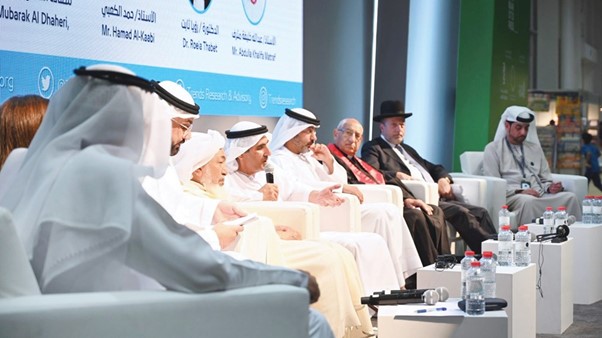TRENDS Research and Advisory organized a panel discussion on “The Role of Religions in Promoting Global Peace” on the sidelines of the Abu Dhabi International Book Fair 2023. The panel featured H.E. Sheikh Abdullah bin Bayyah, President of the Forum for Promoting Peace in Muslim Societies and Chairman of the UAE Council for Fatwa; Dr. Ali bin Tamim, Chairman of the Abu Dhabi Arabic Language Centre, Department of Culture and Tourism – Abu Dhabi; Dr. Khalifa Mubarak Al-Dhaheri, Vice Chancellor for Academic Affairs, Mohamed Bin Zayed University for Humanities; Hamad Al-Kaabi, Editor-in-Chief of Al-Ittihad Newspaper; Dr. Mohammed Abdullah Al-Ali, CEO of TRENDS Research and Advisory; Rabbi Dr. Elie Abadie, Chief Rabbi of the Jewish Council of the Emirates; Reverend Joseph Faragallah, Head of Evangelical Church Council; and Roeia Thabet, Representative of Baha’is of the UAE. The event drew a large audience of academics, officials, and individuals interested in tolerance, human coexistence, religions, and peace promotion.
In his speech, H.E. Sheikh Abdullah bin Bayyah emphasized the importance of dialogue and cooperation among followers of different religions, especially in an era where civilizations intertwine, cultures merge, and interests and relationships collide, making the destiny of humanity a shared one that cannot be ignored. He highlighted the efforts made in recent decades, driven by a sincere belief in the value of cooperation for the common good and a deep understanding that all of humanity is like passengers on a ship, sharing a common destiny and path, with no salvation for humanity except through solidarity and cooperation. Sheikh Abdullah bin Bayyah pointed to the emerging role of religious communities in recent decades through their persistent efforts to create opportunities for peace, both theoretically and practically. He concluded by saying that from Abu Dhabi, the capital of tolerance, movements for peace are vigorous, peace caravans are moving, and paths to peace are open in all directions. These initiatives have become a reality in today’s world, with religion and its leaders playing a positive role.
Hamad Al-Kaabi said that in media, it is customary for words, drawings, images, and vocal tones to carry a message and play a role in influencing the recipient, whether positively or negatively. However, when media terminology is used in an unprofessional context, it can often turn into a means of promoting misleading mental images and improper claims, or even simply become a tool for distortion and misrepresentation that fails to convey the truth. This can lead to misleading the audience, spreading half-truths and lies, ultimately deviating the media message from its professional goals and noble objectives. Delivering a media message professionally can overcome the impact of any stereotypical images or deficiencies in media professionalism. It also ensures that the recipient receives a message that is truthful, supported by facts, statistics, tangible evidence, and concrete data. Even when dealing with a specific group of people, a professional approach avoids promoting stereotypes or using misleading generalizations, distortion, misrepresentation, or any form of misleading or exaggerated presentation.
Al-Kaabi emphasized that overcoming the drawbacks of stereotypical images in media messages requires a professional journalist to detach themselves from personal biases and strive for objectivity in presenting facts. He stressed the importance of expressing this impartiality through neutral language that is clear and understandable to the audience, allowing them to accept the message and elevate their awareness, leading to a genuine internal conviction in the truth of the message.
News link:
Video





